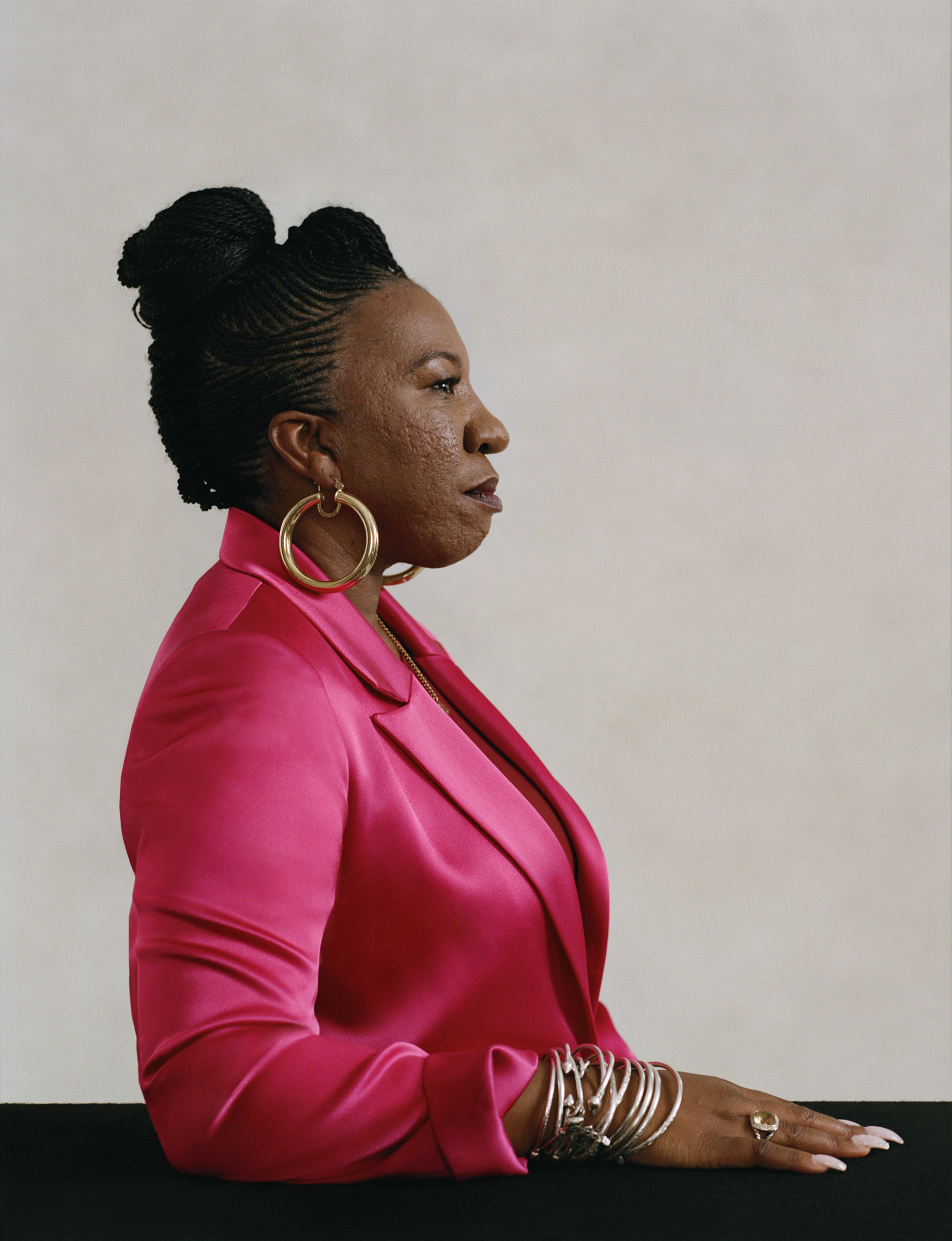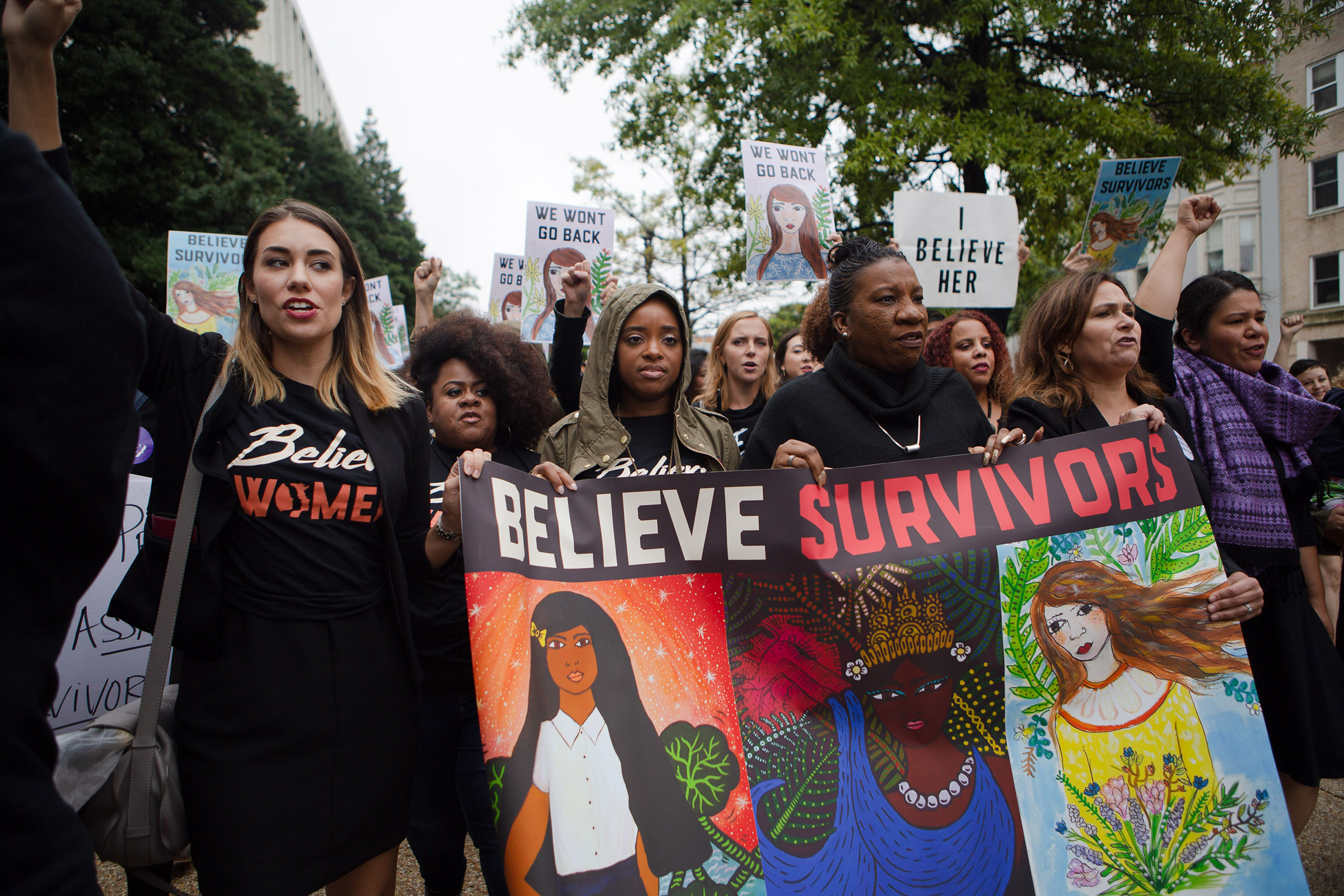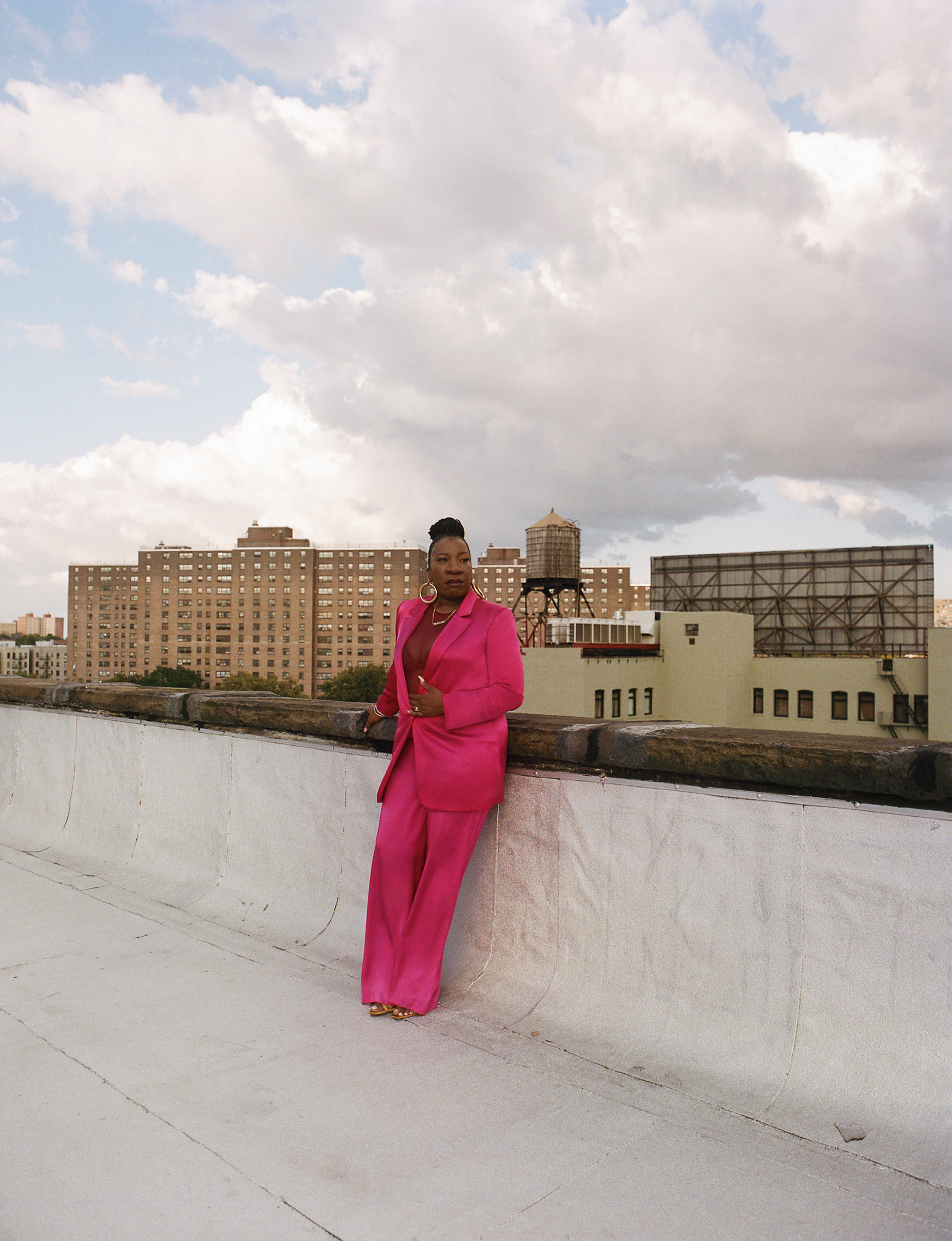
As the outrage over Brett Kavanaugh’s Supreme Court nomination grew, I received an unexpected invitation. Senator Dianne Feinstein asked me to be at the Capitol in person to hear the testimony of Christine Blasey Ford, who had come forward with a claim that she had been sexually assaulted by Kavanaugh 30 years prior, when they were in high school.
I had founded the “me too” movement to support survivors of sexual assault in 2006, so I had spent the year—since the #MeToo hashtag went viral in late 2017—on a lightning-fast run of red-carpet events, magazine covers, and television appearances. They were so far from what was normal in my life that I often felt completely out of sorts. But here was our first major organizing opportunity. Responding to the call of groups fighting against gender-based injustice, survivors and allies sang out in protest against the appointment of the ultraconservative Trump nominee who faced allegations of sexual violence. It was the first time I had seen our cause send people into the streets en masse.
The hearing room was smaller than it looked on television. I remember being unsure where to sit; this wasn’t like a wedding, where seats were assigned by sides. As the session began, the room slowly reorganized itself across partisan lines. Niceties were exchanged as folks swapped seats and scooted down to be allied accordingly. Yet in the end, beyond the political allegiances at the center of that day, only a handful of us were actually there to support Ford.
But hearing her recall the fear she felt during her assault, thinking she might die, how her attacker’s sinister laughter was “indelible in the hippocampus” was more than I could stand. I couldn’t see Ford’s face as she told her story, which Kavanaugh had denied. But I could see her attorney squeeze her arm, or rub her back occasionally. Each small gesture and every change in her voice cracked me open a little bit wider. When they called for a break, I found a bathroom on another floor and holed myself up in a stall so I could cry in peace. It wasn’t long before I heard people come in, so I muffled my cries in my sleeve and pulled myself together. As I stood in front of the sink washing my hands, a woman came up beside me to do the same. I was fairly used to women having a reaction to seeing me in public at this point—and she did. “Oh, my goodness!” she cried out. “It’s you!”
I gave her the warmest smile I could muster.
Read more: The Silence Breakers
“My gosh, what must you think of all of this! This must be something, to see what you have done!” She was gushing now—despite my protestations that I wasn’t personally responsible for this moment. “You and your movement are why we are here today,” she said, “and I am so proud of you and her!”
“I am really, really proud of her too,” I offered, because that was genuinely on my spirit. We were now in a moment, this woman and me; our shared sentiments and heartache for Ford had forged a connection. And then, as has happened so many times before with seemingly sympathetic white women, she dropped her bomb.
“I just wish that she remembered more, you know?”
I don’t think I even allowed a moment for her to take her next breath before the attitude took over my body and I responded, “Ex-cuse me?” I stared at her incredulously.
“Oh! I believe her! Oh, please know that I believe her! I am just talking about for the sake of nailing that bastard! That’s all,” she offered in an attempt to clean it up. “I have never been through anything like that, but I imagine …”
That’s where I cut her off. “Please don’t imagine, Miss.” I implored. I reminded her that we—survivors like Christine Blasey Ford and me, but also her co-workers, neighbors, and friends—were there to tell her exactly how it was.
I was trying not to allow a single tear to drop. I knew this lady didn’t mean any harm, but what she had said sent me to a place I don’t often go. Looking directly into her eyes, I said, “I was 7 years old the first time I was raped.”
I gave it a beat to let it register. “I am now 45 years old,” I continued. “I have had a very full life with lots of highs and lows, and I am flawed in many ways that I task myself at improving on a regular basis. But you know one of the flaws I have the hardest time with?” I didn’t wait for her response. “My memory,” I told her. “It’s because I have spent every single day of the last 38 years trying to forget. I don’t want any memories if they have to include the memory of hot, stinky breath on my face and clammy hands roaming around where they don’t belong. We are lucky that she is able to recall anything at all, and if all we have to do is take in the words that took her three decades to pull from the pit of her stomach, to the back of her throat, and push them out of her mouth—then we should all feel privileged to do just that without judgment or complaint.”
The tears had come. So had this woman’s. Her face was flushed, and she stammered out an apology that I told her wasn’t necessary, if she would just please not repeat that critique of Ford’s testimony. She agreed, and I found my way back into the hearing.

I think of that woman often. She was on “our side”—an ally. She meant well, but in many ways she was not much different from the detractors who have spent the past five years judging the effectiveness of #MeToo by the failures of the very same political systems and cultural norms that gave birth to the movement. That inability to take into account what the movement has made possible was a sign of a larger failure.
That singular interaction, coupled with what I experienced throughout the hearings, helped me pivot from how I had been looking at the work ahead. I had been grappling with how all of this attention could be harnessed to advance my vision for a world without sexual violence. I knew these individual cases didn’t help people see sexual violence as a human-rights or social-justice issue. As long as it was reduced to feelings about individuals, everyday citizens wouldn’t make the connection to the social, political, economic, and community impact of sexual violence. Now, I was clear that we would have to show the world that this movement was about reimagining safety, understanding bodily autonomy, and shifting culture.
When #MeToo went viral on Oct. 15, 2017, millions of people around the world made a courageous decision to reveal their darkest secrets. The sheer number—12 million responses on social media in 24 hours—ensured that the stories could not be ignored. Many survivors, like me, felt simultaneous dread and hope at this vulnerable moment of reckoning. But I also knew that moments like this were once-in-a-lifetime for movements like ours.
I cut my teeth learning from veterans of some of the most important movements of the past century: civil rights, Black liberation, labor, and anti-apartheid. The elders would often share stories of how they capitalized on national attention. Sometimes they created those crucial moments—like Rosa Parks refusing to give up her seat on the bus, which led to the Montgomery bus boycott. Sometimes those moments were born out of tragedy—like the murder of Jimmie Lee Jackson, which led to Bloody Sunday and the march from Selma to Montgomery. These organizers had been prepared to act, and our movement was no different.
Captains of industry were removed from positions of power, and people outside the spaces that were already deeply engaged in this work called it a victory. I understand how it feels that way. Watching those who have abused others be forced to account for their predatory behavior evokes any number of emotions. Vindication, relief, and even hope that this would lead to larger change. But feelings, as my elders would often say, are not facts.
As the years passed, the backlash mounted and the outcomes of accusations started to revert to what is statistically normal in this country. Patriarchy, misogyny, and sexism had a huge head start by the time we joined the race. While the movement was given a shot in the arm by #MeToo, the idea that it would be the antidote to decades of entrenched ideas and behaviors is wildly unrealistic. Yet when the triumphs became tragedies, suddenly the movement was failing. Titillating headlines, dramatic court cases, and discourse about what #MeToo had accomplished became the focus. But while those individual stories may be relevant, they aren’t at all descriptive of what this movement is or prescriptive for where it is going.
Those millions of people who responded to the hashtag exist because sexual violence is a pervasive public-health crisis. There are over 330 million people in the United States, and every 68 seconds, on average, one experiences sexual violence. In the time it takes you to read this essay, at least five more people will be able to say, “me too.” Many of them will be children. There are 73 million children under 18 in the U.S. One in every 10 will have their lives forever marked by sexual violence before they graduate from high school. Those children will become adults at higher risk of mental-health issues and physical ailments as well as incarceration and drug use, and four times more likely to experience some form of PTSD. Most of these survivors have suffered in silence for years—some for decades.
More than any law that has been passed or policy that has been changed in the past five years, this movement has created visibility and community for those of us who thought we might go to our grave bearing a shame that was never ours to carry in the first place.

The world is forever changed because of #MeToo. The language we use is shifting, replacing words like victim with survivor. We talk about mental health and healing, and employers are crafting thoughtful human-resource policies, not just reacting after a workplace harassment crisis. Consumers are more conscientious about the cultural content they consume and vocal about calling out rape culture when they see it. Do these changes translate to more people going to jail for the crime of sexual assault? Probably not. But I have a better question—is that the goal?
For decades, there have been laws against sexual violence. There is no evidence that carceral solutions are actually working. What we want is to dig up the roots of sexual violence so that it doesn’t happen in the first place. The #MeToo movement made it so that high-profile cases couldn’t be ignored, but blaming the movement for their unfavorable outcomes is to turn a blind eye to the systems of power and privilege that created them.
The reality of sexual violence in this country is told in those millions of posts across social media from October 2017. It is told in the stories whispered in my ear by little Black girls in Selma, Ala., back in 2006, when “me too” began. These everyday people have had their lives interrupted by a violence they didn’t ask for; their trauma mocked by a culture that is more invested in shaming or ignoring them than in being accountable to them; and their pursuit of healing and justice betrayed by a system that doesn’t serve them.
If the past five years have taught us anything, let it be that the #MeToo movement is not a spectator sport. Its fate is not decided in the court of law or the court of public opinion. The #MeToo movement is what we make it, by how we commit to dismantling rape culture and undermining the violence it creates; it’s how we take responsibility for creating a world without sexual violence; and how we respond to the needs of the survivors who are already here. Like that woman in the bathroom who wished that Christine Blasey Ford “remembered more.” So long as we in one breath say that we believe survivors, and in another deny them the dignity they deserve, we will be focusing on answering the wrong questions and overlooking the right ones—like how have we created a world where 12 million outcries in 24 hours isn’t enough for us to fight like hell to address it?
In her book Breathe: A Letter to My Sons, the feminist scholar and author Imani Perry writes, “Awareness is not a virtue in and of itself, not without a moral imperative.” Five years ago, millions of people across the globe used the hashtag #MeToo to find safety and solidarity. Survivors introduced a world of possibility to the fight to end sexual violence. Now we are moving beyond the hashtag to build a culture predicated on consent and harm reduction. This is our moral imperative.
The millions of outcries can’t be unheard. To those who came forward—the words can’t be unsaid. Survivors did their part by waking the world up to this crisis. Please don’t let another 68 seconds pass without doing yours.
More Must-Reads From TIME
- The 100 Most Influential People of 2024
- The Revolution of Yulia Navalnaya
- 6 Compliments That Land Every Time
- What's the Deal With the Bitcoin Halving?
- If You're Dating Right Now , You're Brave: Column
- The AI That Could Heal a Divided Internet
- Fallout Is a Brilliant Model for the Future of Video Game Adaptations
- Want Weekly Recs on What to Watch, Read, and More? Sign Up for Worth Your Time
Contact us at letters@time.com